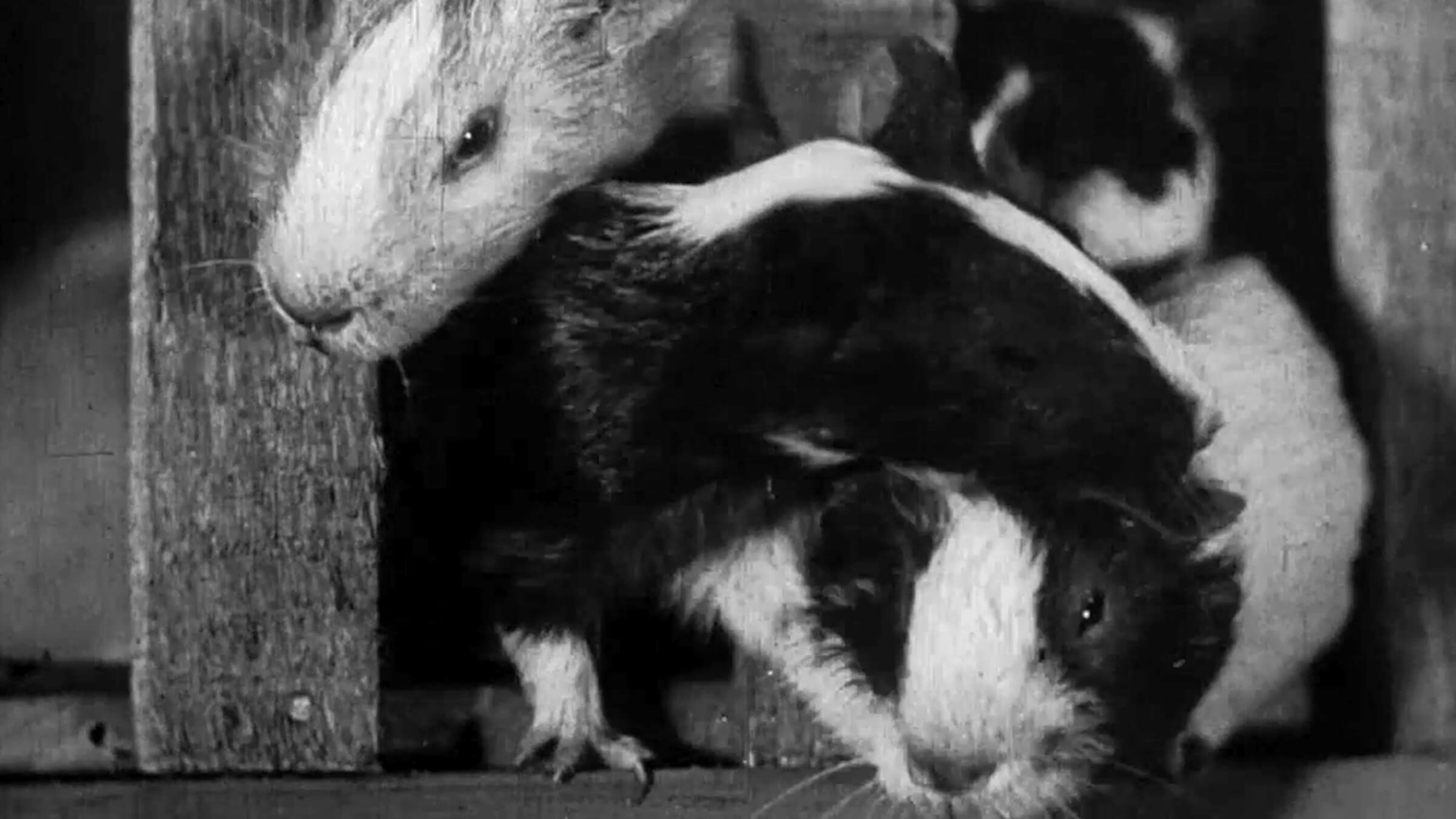The Soviet film corpus of the silent era—the mass of films that survived that tumultuous era, at least—is famous for formal innovation, social realism, and headlong propaganda. But not for farce. Comedy was the commercial lifeblood of silent film; without it, a national industry could scarcely hope to function. But the sociopolitical pressure of the new Soviet project, along with its fiercely pedagogical attitude toward its massive and far-flung native audiences, made comedies a seeming rarity. What’s so funny about work, pride, and authoritarianism, anyway?
Well, as Khanan Shmain’s Pigs Will Be Pigs proves, the Soviet cultural machine was not quite as homogeneous and bullet-headed as we think it was, or as the Politburo probably would’ve liked. Comedy happened, at least sometimes. Originally titled Stantsiya Pupky, or Pupky Station, this lowdown lark is through and through a Ukrainian film, saturated with stubborn local norms and happily self-distracted from any notion of Communist ideology. Long considered lost until it turned up in the German Federal Archives in 2015, Shmain’s modest film liberally assaults and mocks Soviet bureaucracy for its self-important idiocies, from a disrespectful provincial perspective. Set almost entirely in a remote rural train station unprepared for traffic of any kind, and beset by an occupation of guinea pigs, the movie feels about as anti-authoritarian as any Soviet silent ever made. In fact, Ivan Kozlenko, former director of the Oleksandr Dovzhenko National Film Archive in Kyiv, noted on social media when the film was found that “comedies are perhaps the worst preserved genre of the Ukrainian silent period … they were the first to be banned and often never even made it to the screen. Today we know of just five surviving Ukrainian comedies.”
More than a little Ma and Pa Kettle in its skewering of both lazy hayseeds and the establishment forces who think they’re in control, Pigs was actually sourced from all-American pulp: it’s a loose and uncredited adaptation of Ellis Parker Butler’s goofy and apparently beloved story “Pigs Is Pigs,” from 1905, which had, by the end of the silent era, already been turned into comedy two-reelers twice (once in 1914 with forgotten star John Bunny) and saw a final incarnation as a Disney cartoon in 1954. (There is no relation, however, to the 1937 Warner cartoon directed by Friz Freleng, also called Pigs Is Pigs.) Rather than specifically exuding the corn-pone Americana in the recipe, however, Shmain’s film toggles the tale’s satiric focus toward the USSR’s newfangled “scientific” administrative hysteria.
The domino-cascade of a tale begins with the arrival at Pupky Station of a student carting two pregnant guinea pigs in tiny wooden cages—illegal passengers, it seems, as the rulebook maintains that animals of any kind, particularly “pigs,” cannot accompany passengers in general carriage. The fact of their pregnancy is itself a cause for hysterical panic among the passengers. The station, the kind where farm pigs wander on the tracks and the staff of two expect nothing of interest to ever happen, is hardly equipped to handle the disruption. The gruff station master (Konstantin Garin) and his bandy-legged, dull-witted assistant (Ivan Tverdokhlib) struggle to settle the guinea pigs’ destiny before litters of more arrive, and as a detached wagon filled with grain seed for the local kolkhoz somehow goes missing. (“Nothing is ever lost in Pupky,” we’re told by both the station master and, sarcastically, by the film’s intertitles.) Through it all, the guinea pigs themselves exercise a charm offensive on virtually every Soviet citizen in sight, not unlike the furry affect of the proliferating alien puffballs in the famous Star Trek episode “The Trouble with Tribbles” (1967).
Likewise, the pigs begin multiplying at a preposterous rate, as the cigar-chomping stuffed shirts at the junction station bicker and wrangle about what should be done about them, taking time for a ponderous zoological lecture and arriving at an enthusiastic conclusion: “We’ll appoint a COMMISSION!” Meanwhile, a determined kolkhoznitsa (played by M. Sidorova, who some sources rather daringly suggest is famed Russian opera singer Mariya Maksakova, née Sidorova) plunges into the local bureaucracy to find the errant seed wagon, a Kafkaesque nightmare Shmain riotously stages on an ingeniously devised set built like a revolving merry-go-round—the poor woman literally goes in circles, from window to window, as the apparatchiks whiz by and the buck gets perpetually passed. Eventually, the two threads collide when Tverdokhlib’s lazy yokel, faced with the dilemma of where to put the now-uncountable guinea pigs, decides to house them in an apparently orphaned storage car left on a nearby siding …
The subtle, derisive recalcitrance at the heart of Pigs Will Be Pigs isn’t, on one hand, surprising—this is a Ukraine that still remembered the incomparable chaos of the 1917–21 War for Independence, which it lost, and still bridled at being subsumed into the larger Communist state. Shmain’s film spits in the Politburo’s eye despite Joseph Stalin’s various efforts to suppress what was left of Ukrainian resistance, from the recent takeover of the Ukrainian film studio by Soyuzkino after accusations of nationalism and “unacceptable behavior,” to the routine imprisonment and execution of Ukrainian patriots, to forced collectivization and the ensuing man-made famine that killed millions of Ukrainians. Considering the violence and repression brought to bear on Shmain’s countrymen during this period, it seems almost crazy to make a film—a comedy, no less—that so fiercely disrespects the entire Soviet apparatus.
Shmain himself has a scattershot filmography as a result, though he did not share the stubborn independence nor the fate of his mentor from the 1920s: avant-garde theater director Les Kurbas was sent to the gulag in 1933 and executed in 1937. Shmain endured with a low profile, tolerating a relocation to Moscow, surviving World War II as a German POW, and finally spending decades in state production, primarily working on propaganda and scientific films, but also on the occasional comedy. He died in 1969.
It’s hardly surprising, then, given the history, that Pigs Will Be Pigs had long ago vanished from the film culture radar, as so many silent films have, in Ukraine and elsewhere. Its freakish reappearance, however, comes with an additional layer of historical puzzlement: this lone German print comes with a distinctive preamble, added as a warning to whomever the privileged Weimar viewer in fact was. With “special permission,” the film, which was otherwise “prohibited for public screenings in Germany,” could be seen but “it is strictly forbidden to tell unauthorized people about the screening and the content of the movie.” Germany in 1931 was a political rumble, with the Nazis and the Communist Party occupying the opposing extremes of an intensely unstable and sometimes violent political landscape, and German censors were very sensitive to the incitement potential of Soviet propaganda films like Eisenstein’s Battleship Potemkin (1925). But why Shmain’s bouncy little film, which seems to have posed a threat only to Soviet pride, would have been banned there remains for us a mystery, as is who were the special few “authorized” to screen it, and why they were sworn to secrecy about what they saw.
A comedy about guinea pigs? Woodrow Wilson once supposedly remarked that Griffith’s The Birth of a Nation (1915) was “like writing history with lightning,” which was not at all true of Griffith’s film, narratively speaking, but in a larger sense it’s true of all movies, which freeze in time their own historical moment and context like a fly in amber. It’s an essential fascination inherent in early-century movies, and Shmain’s opens a delightful window on a historical slice of Ukrainian history, sans Marxist glorification or state messaging, at a time more than ninety years later when the resistance of the Ukrainian spirit is once again defying totalitarian might.
Presented at SFSFF 2023 with live musical accompaniment by Guenter Buchwald and Frank Bockius

